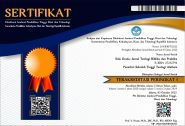Refigurasi Daud Sebagai Pahlawan: Analisis Narasi Terhadap Teks 1 Samuel 16-18 Dengan Konsep Refigurasi Paul Ricoeur
Abstract
Abstract:This study aims to understand the refiguration of David as a hero through narrative analysis in 1 Samuel 16–18, using Paul Ricoeur's concept with a qualitative-descriptive approach. The analysis results show that readers in the prefiguration understand the hero, who is often described as a physically strong, brave, and heroic person born from a noble or knightly family. Configuration shows that each narrative part significantly shapes David's heroic character. Key themes such as divine election and power conflict and how tension is built through the contrast between Saul's decline and David's ascension also clearly influence the development of David's heroic character. Refiguration shows that David's heroism and leadership were a divine calling. David combined physical strength with spiritual strength, courage with wisdom, and humility with leadership charisma. David's internal character (faith, honesty, sincerity, experiences, and humility) also played a crucial role in his success as a hero or leader.
Abstrak: Studi ini bertujuan untuk memahami refigurasi Daud sebagai pahlawan melalui analisis narasi dalam 1 Samuel 16-18 menggunakan konsep Paul Ricoeur dengan pendekatan kualitatif-deskriptif. Hasil analisis menunjukkan bahwa pembaca dalam prefigurasi memahami tentang pahlawan yang sering kali digambarkan sebagai seorang yang kuat secara fisik, berani, dan heroik yang lahir dari kalangan keluarga bangsawan atau ksatria. Konfigurasi menunjukkan setiap bagian narasi secara signifikan membentuk karakter kepahlawanan Daud. Tema-tema utama seperti pemilihan ilahi dan konflik kekuasaan, serta bagaimana ketegangan dibangun melalui kontras antara penurunan Saul dan kenaikan Daud juga sangat jelas mempengaruhi perkembangan karakter kepahlawanan Daud. Refigurasi menunjukkan bahwa kepahlawanan dan kepemimpinan Daud merupakan panggilan ilahi. Daud menggabungkan kekuatan fisik dengan kekuatan spiritual, keberanian dengan kebijaksanaan, dan kerendahan hati dengan karisma kepemimpinan. Karakter internal Daud (keyakinan, kejujuran, ketulusan, pengalaman dan kerendahan hati) juga memainkan peran krusial dalam menentukan keberhasilannya sebagai pahlawan atau pemimpin.
Full Text:
PDF (Bahasa Indonesia)References
Alter, Robert. The David Story : A Translation with Commentary of 1 and 2 Samuel. New York & London: W. W. Norton & Company, 1999.
Auld, A. Graeme. I & II Samuel : A Commentary. Louisville, Kentucky: Westminster John Knox Press, 2012.
Balfour, R. J. “Rejection Realized: Saul, the Evil Spirit and the Loss of Kingship.” Journal for the Study of the Old Testament 47, no. 2 (December 1, 2022): 206–22. https://doi.org/10.1177/03090892221116918.
Bodner, Keith. 1 Samuel: A Narrative Commentary. Sheffield: Sheffield Phoenix Press, 2009.
Borgman, Paul. David, Saul, and God : Rediscovering an Ancient Story. New York: Oxford University Press, 2008.
Brueggemann, Walter. First and Second Samuel: Interpretation: A Bible Commentary for Teaching and Preaching. Louisville, Kentucky: Westminster John Knox Press, 1990.
Esler, Phillip F. “David and Goliath (1 Samuel 17:1—18:5).” Sex, Wives, and Warriors, October 14, 2020, 180–215. https://doi.org/10.2307/J.CTT1CGF12K.12.
Evans, Paul S. 1-2 Samuel: The Story of God Bible Commentary. Edited by Tremper Longman III and Scot McKnight. Grand Rapids: Zondervan, 2018.
Fodor, James. Christian Hermeneutics: Paul Ricoeur and the Refiguring of Theology. New York: Oxford University Press, 1995. https://doi.org/10.1093/ACPROF:OSO/9780198263494.001.0001.
Gunn, David M. The Fate of King Saul : An Interpretation of a Biblical Story. Sheffield, England: JSOT Press, 1989.
Herbst, John William. “Valuing Leadership and Love: David Exceeding Samson.” Journal for the Study of the Old Testament 43, no. 3 (March 1, 2019): 491–505. https://doi.org/10.1177/0309089218786090.
Johnson, Benjamin J. M. Reading David and Goliath in Greek and Hebrew : A Literary Approach. Tübingen, Germany: Mohr Siebeck, 2015.
Johnson, Benjamin J.M. “David Then and Now: Double-Voiced Discourse in 1 Samuel 16.14-23.” Journal for the Study of the Old Testament 38, no. 2 (December 2013): 201–15. https://doi.org/10.1177/0309089213475401.
———. “Making a First Impression: The Characterisation of David and His Opening Words in 1 Samuel 17:25-31.” Tyndale Bulletin 71, no. 1 (2020): 75–93. https://doi.org/10.53751/001C.27736.
Keren, Orly. “David and Jonathan: A Case of Unconditional Love?” Journal for the Study of the Old Testament 37, no. 1 (September 2012): 3–23. https://doi.org/10.1177/0309089212455544.
Klein, R. Lillian. The Triumph of Irony in the Book of Judges. Sheffield: The Almond Press, 1989.
Millgram, Hillel I. Judges and Saviors , Deborah and Samson: Reflections of a World in Chaos. London: Hamilton Books, 2018.
Ricoeur, Paul. On Paul Ricoeur : Narrative and Interpretation. Edited by David Wood. London & New York: Routledge, 1991.
———. Time and Narrative, Volume 1. Edited by trans. K. McLaughlin and D. Pellauer. Chicago and London: University of Chicago Press, 1983.
Sellars, Dawn Maria. “An Obedient Servant? The Reign of King Saul (1 Samuel 13-15) Reassessed.” Journal for the Study of the Old Testament 35, no. 3 (March 2011): 317–38. https://doi.org/10.1177/0309089211398710.
Tsumura, David T. The First Book of Samuel: New International Commentary on the Old Testament. Grand Rapids: Eerdmans, 2006.
Yates, Christopher. “Refiguring the Essential Word: The Work of the Imagination in Ricoeur’s Late Apprenticeship.” Philosophy and Social Criticism 37, no. 2 (March 8, 2011): 229–37. https://doi.org/10.1177/0191453710387078.
DOI: https://doi.org/10.47596/sg.v5i1.244
Refbacks
- There are currently no refbacks.
SOLA GRATIA diindeks oleh:
Published: Sekolah Tinggi Teologi Aletheia
Address: Aletheia Theological College, Jl. Argopuro No.28-34, Lawang, Kec. Lawang, Kabupaten Malang, Jawa Timur 65211
Website E-Jurnal: http://sttaletheia.ac.id/e-journal/index.php/solagratia/index
e-ISSN 2723-2794, p-ISSN 2723-2786 
Ciptaan disebarluaskan di bawah Lisensi Creative Commons Atribusi-BerbagiSerupa 4.0 Internasional.
Copyright © SOLA GRATIA: Jurnal Teologi Biblika dan Praktika. All Rights Reserved.






.png)